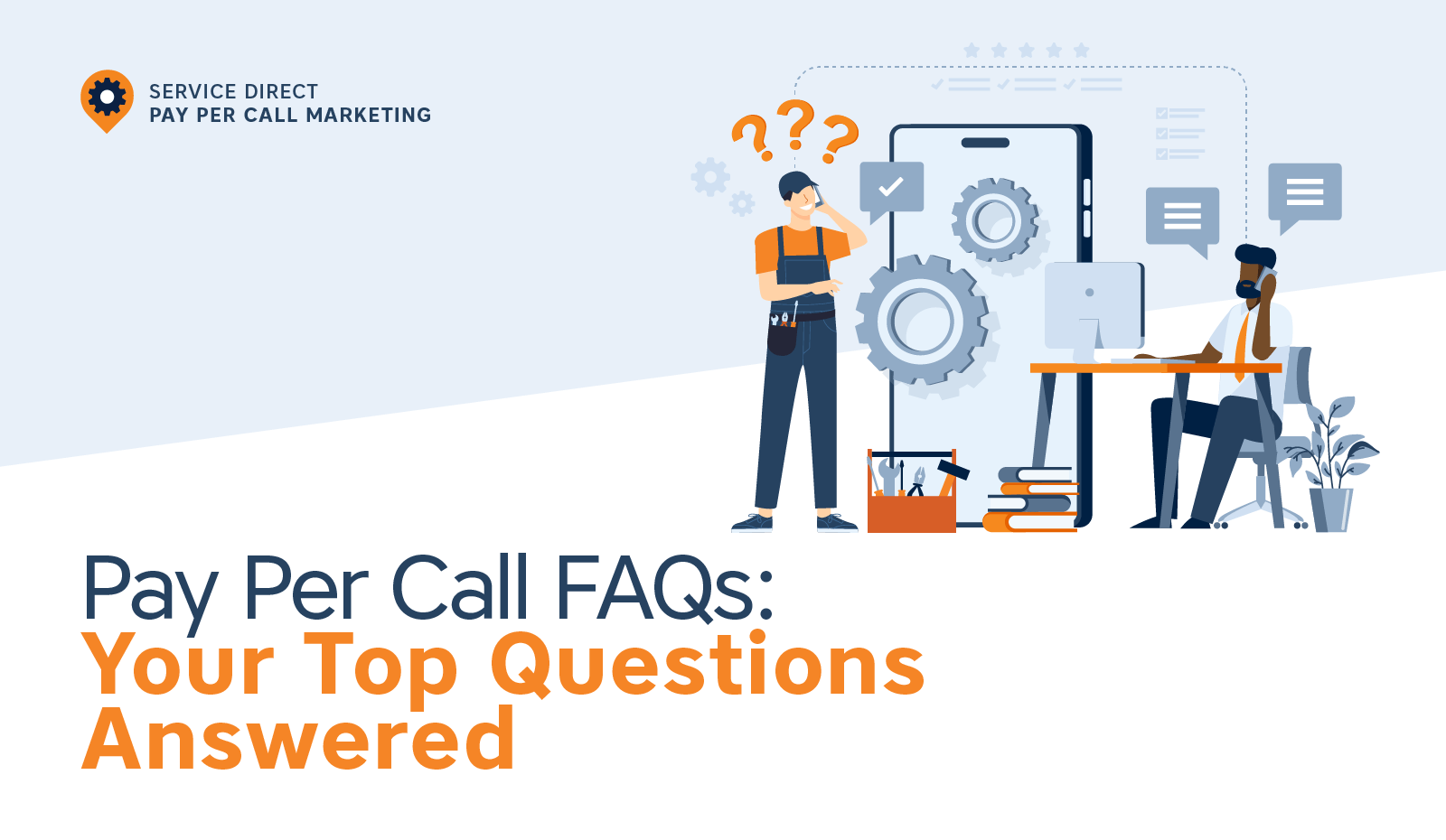Pay Per Call FAQs: Your Top Questions Answered
In the digital age, businesses are constantly searching for effective lead generation strategies. One method that’s gaining significant attention is pay per call advertising.
Unlike traditional click-based models, pay per call prioritizes high-quality phone leads, making it ideal for businesses that benefit from direct customer interaction. If you’re curious about this strategy and how it could benefit your business, you’ve come to the right place.
In this blog, we’ll address common questions surrounding pay per call lead generation and guide you through the process of getting started.
1. What is pay per call lead generation?
At its core, Pay Per Call lead generation is a marketing strategy where businesses pay for inbound phone calls rather than clicks or online form submissions. This advertising model works well for industries that rely on conversations to close deals, such as legal services, healthcare, insurance, and home services.
In a pay per call campaign, businesses set up ads that encourage potential customers to call a dedicated phone number. The advertiser then pays a set fee every time a qualifying call is made. Since these calls typically come from individuals who are ready to take action, they often have a much higher conversion rate than traditional online leads.
2. What are the benefits of Pay per Call Advertising?
Pay per call advertising offers several advantages, particularly for businesses that prioritize quality over quantity.

Here are a few key benefits:
- High-Quality Leads: Pay per call leads are generally more qualified because they come from people who are ready to speak directly with a representative. This leads to better conversion rates compared to digital clicks.
- Increased ROI: Since you’re paying for actual phone calls instead of clicks that may not lead to conversions, your return on investment (ROI) tends to be higher with pay per call.
- More Control Over Lead Volume: Businesses can control the volume of calls they receive by adjusting their advertising spend and setting parameters around the types of calls they want to attract.
- Trackable Results: With pay per call advertising, you can easily track the success of your campaigns by measuring call duration, caller demographics, and conversion rates. This allows you to optimize your strategies in real-time.
- Improved Customer Engagement: A direct phone conversation offers a more personalized customer experience, allowing businesses to build stronger relationships with leads.
3. What Industries Benefit most from pay per call?
While pay per call lead generation can work for many industries, it’s particularly beneficial for those that rely on high-value transactions or need to provide personalized service over the phone.
Some of the top industries that benefit from pay per call marketing include:
- Auto Services: Companies who can answer the phone and provide immediate services like towing benefit from PPCall.
- Healthcare: Patients can schedule appointments or get consultations quickly.
- Legal Services: Potential clients can discuss their cases and seek advice directly.
- Home Services: Companies like plumbers, electricians, and HVAC technicians can book appointments or provide emergency services immediately.
These industries rely heavily on phone interactions to convert leads into customers, making PPCall an excellent choice for driving business.
4. What is the Difference Between Pay Per Call and Pay Per Click?
Though they sound similar, pay per call and pay per click (PPC) advertising are quite different.
Here’s how they compare:
- Pay Per Click (PPC): With PPC, advertisers pay for each click on their ad, regardless of whether the click results in a conversion. It’s a broader approach designed to drive traffic to a website or landing page.
- Pay Per Call: In contrast, pay per call advertising focuses on generating phone calls. Advertisers only pay when a potential customer calls their business, which usually leads to higher-quality leads and more personalized interactions.
The main difference is the medium: PPC generates clicks and online traffic, while pay per call generates direct phone conversations. Depending on your business model, one may be more effective than the other, or both strategies could work together.
5. How Much Does Pay Per Call Cost?
The cost of pay per call campaigns can vary significantly based on factors such as the industry, the target audience, and the quality of the calls. Higher-value industries like legal services, water damage restoration, or healthcare typically pay the most.
Here are a few factors that affect pricing:
- Call Quality: Higher quality leads (e.g., longer calls or calls that result in sales) typically cost more.
- Industry: Competitive industries like legal or financial services generally have higher costs per call due to the value of each lead.
- Location: Geographic targeting can impact costs, with some areas commanding higher rates than others.
Ultimately, businesses should calculate the potential return on investment based on conversion rates and customer lifetime value to determine whether the cost of pay per call marketing makes sense for them.
6. How can I optimize My Pay Per Call Campaigns?
To get the most out of your pay per call campaigns, optimization is key.
Here are a few strategies to help you maximize your results:
- Target the Right Audience: Ensure your ads are reaching the right people by using demographic and geographic targeting.
- Use Effective Call-to-Actions (CTAs): Encourage users to call by using strong CTAs like “Call Now for a Free Quote” or “Speak with a Specialist Today.”
- Track and Analyze Calls: Use call tracking software to monitor the quality of your calls, identify trends, and adjust your campaigns as needed.
- Work With an Expert PPCall Company: Companies like Service Direct not only know how to drive quality phone calls to your business, but we also provide data to help optimize your campaigns as you go.

Regularly reviewing and adjusting your campaigns can lead to better performance and more conversions.
7. What is the best pay per call network?
There are several pay per call networks to choose from, each with its own strengths. When selecting a network, it’s important to consider factors such as the industries they specialize in, the quality of their calls, and their reputation in the market.
Some popular pay per call networks include:
- RingPartner
- Service Direct
- Aragon Advertising
- Angi
Each of these networks offers unique features and tools to help businesses optimize their pay per call campaigns. Researching and choosing the right network for your business and goals is critical to success.
8. What is Pay Per Call Affiliate Marketing?
Pay per call affiliate marketing allows affiliates (publishers) to earn commissions by driving phone leads to advertisers. Affiliates promote ads that encourage users to call, and when the user makes a qualifying call, the affiliate receives a commission.
This type of marketing is popular in industries where phone leads are valuable, such as insurance or home services. It’s a mutually beneficial relationship where affiliates help advertisers reach more potential customers while earning revenue for themselves.
9. How do I get Started with Pay Per Call?
If you’re ready to dive into pay per call marketing, here’s how to get started:
- Choose a Pay Per Call Network: Research networks that specialize in your industry and offer the features you need.
- Set Campaign Goals: Define what you want to achieve, such as the number of calls or conversions.
- Convert Calls to Customers: Train your team to convert every possible call to a paying customer.
- Track and Optimize: Monitor your campaigns regularly and make adjustments as needed to improve performance.

By following these steps, you can build a successful pay per call lead generation strategy that delivers high-quality leads and boosts your business.
In Conclusion
Pay per call lead generation is a powerful strategy for businesses looking to connect directly with high-intent customers. By focusing on phone calls, businesses can increase conversions, build better customer relationships, and improve ROI.
No matter what industry you're in, pay per call marketing can help you reach your target audience and grow your business. If you’re ready to get started, research networks and create a strategy that aligns with your business goals.




